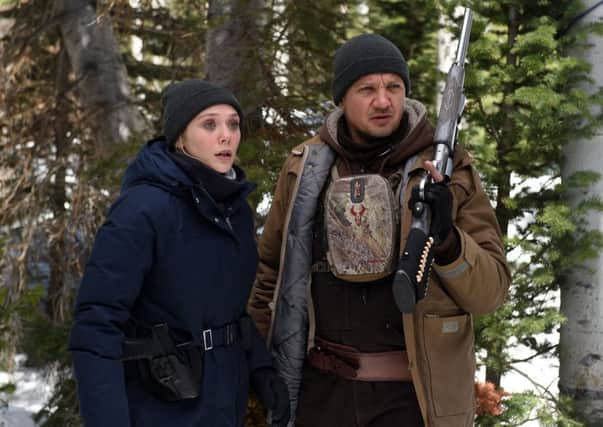Film reviews: Wind River | Insyriated | Moon Dogs | The Vault


Wind River (15) ****
Insyriated (15) ***
Moon Dogs (15) **
The Vault (15) **
Taylor Sheridan follows up his acclaimed screenplays for David Mackenzie’s Hell or High Water and Denis Villeneuve’s Sicario with his first directorial effort since making the transition from being a supporting actor on TV shows such as Sons of Anarchy to an A-list Hollywood writer with an Oscar nomination to his name. Like his scripts for those films, Wind River is another muscular, modern-day western, full of tense action and tough, taciturn characters trying to navigate life on the fringes of America. But if Sicario and especially Hell or High Water explored the damaging legacy of the frontier myth on a country that’s rigged to favour the few, then Wind River makes the connection more forceful, set as it is on a Native American reservation that’s been left to its own devices with none of the infrastructure necessary to let its inhabitants thrive.
The film opens – as movies like this often do – with the death of a young woman. Discovered miles from anywhere in the frozen wilds of Wyoming’s Wind River reservation, she’s found and identified by Jeremy Renner’s Cory Lambert, a game tracker with the US Fish and Wildlife Service. He knows the girl, knows her family, knows that something horrifying must have forced this Native American teenager to run barefoot through the night until her lungs packed up. He also knows the landscape will tell the authorities more about her death than the recalcitrant locals, who take a dim view of the young FBI agent, Elizabeth Olsen’s Jane, who’s arrived on the scene from Las Vegas, woefully unprepared for the extremes of Wyoming in winter.
Advertisement
Hide AdOf course, Jane knows she’s out of her depth right away. She also knows she’s not really there to solve the case: she’s there to secure the crime scene and wait for the cavalry. But as Graham Greene’s tribal police chief tells her, “This isn’t the land of back-up, this is the land of you’re-on-your-own”, so when bureaucratic complications threaten to prevent a full FBI investigation being initiated, she knows it’s up to her to prove the girl was murdered and recruits Lambert to help her investigate her death.
Though this might make Wind River sound like a typical “white saviour” fantasy, the film interrogates that old western trope in ways that are more subtle and complicated than are immediately apparent from its high-impact action sequences and vengeance-fuelled finale. Cory’s connection to the reservation runs deep, bound up in a tragedy of his own that the film gradually reveals via his frosty relationship with his estranged wife. Sheridan also creates a perpetual air of unease by repeatedly casting doubt upon those in authority that locals and interlopers alike are supposed to respect, especially when nature ultimately has the final say.
Making the most of his best leading role since The Hurt Locker, Renner burrows deep into his character, his empathetic turn helping the film traverse the difficult territory it’s set out for itself. Olsen too does good work, her character’s resolve never obscured by her vulnerability. A contentious final-act reveal might throw some for a loop with its jarring brutality, but there’s also an admirable air of confidence in the way Sheridan has structured the film, balancing its violent extremes with quieter emotional moments in which the broader social injustice the film is exploring can’t help but bubble up through the cracks.
The daily impact of war on ordinary civilians is the subject of Insyriated, a tense if stagey drama about an extended Syrian family trying to maintain an uneasy existence as the last residents in an apartment block caught in the crossfire of war. Hiam Abbass takes the lead as the matriarch who decides to withhold from her neighbour the fact that her husband has been shot leaving their building that morning. Over the course of the day that secret gnaws away at those who hold it, intensifying an already fraught situation in which any number of atrocities are being perpetrated mere metres away. Belgian filmmaker Philippe Van Leeuw creates a palpable dread at the daily horrors confronting those unlucky enough to caught up in a war zone, but the single location and over-reliance on melodrama as the film progresses rob it of the some of the profundity for which it’s clearly striving.
Weak attempts at comedy, one-note characterisation and clunky tonal shifts ensure Scottish road movie Moon Dogs is little more than another dispiriting example of the way so many publicly funded British comedies prize wackiness and winsomeness over characters and plotting that feel in any way believable. This one follows reluctant stepsiblings Michael (Jack Parry-Jones) and Thor (Christy O’Donnell) as they decide to travel from their home in Shetland to Glasgow, where Michael’s girlfriend has gone to university, leaving him uncertain about the state of their relationship. Along the way they meet rebellious musician Caitlyn (Tara Lee), who’s en route to a gig at Celtic Connections, but whose sexually forthright, anti-authoritarian, cool girl attitude is really just an affectation designed to lead Michael and Thor to a better understanding of themselves.
Putting a supernatural spin on the heist movie, The Vault casts James Franco as a bank manager who knows there’s more hidden in the basement of his employers’ spooky building than the $6 million in cash that the crew of bank robbers currently holding his staff hostage are intent on stealing. Sadly, despite an intriguing idea, the two genres don’t fuse together in a satisfying way resulting in a film that feels a little broken-backed. ■